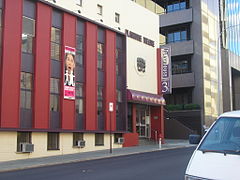The Playhouse Theatre (Perth)
| Playhouse Theatre | |
|---|---|

Playhouse Theatre facade, Pier Street, Perth
|
|
| General information | |
| Type | Theatre |
| Address | 3 Pier Street |
| Town or city | Perth, Western Australia |
| Country | Australia |
| Coordinates | 31°57′21″S 115°51′42″E / 31.9559°S 115.8617°E |
| Completed | 1956 |
| Inaugurated | 22 August 1956 |
| Cost | £65,000 |
| Client | National Theatre Company |
| Owner | Diocese of Perth |
| Landlord | Perth Theatre Trust |
| Design and construction | |
| Architecture firm | Krantz & Sheldon |
| Website | |
| The Playhouse Theatre | |
The Playhouse Theatre in central Perth, Western Australia was purpose-built for live theatre in the 1950s and remained one of the city's principal venues for performing arts for over half a century until replaced by the State Theatre Centre of Western Australia in January 2011. It was demolished in October 2012 as part of a redevelopment of Cathedral Square.
The theatre was constructed adjacent to St George's Cathedral on Pier Street land owned by the Anglican Church, the former site of the Church of England Deanery tennis court. The building was designed by the local architectural firm of Sheldon & Krantz and constructed at a cost of £65,000. The main lobby contained a mural by local brutalist architect Iwan Iwanoff. The theatre was formally opened on 22 August 1956 to a capacity audience of 700, with the opening production of John Patrick’s 1953 Pulitzer Prize-winning play The Teahouse of the August Moon.
In 1919 the establishment of the Perth Repertory Club had led to the development of a strong local amateur-based theatre scene. The Repertory Club initially worked out of a basement room at the Palace Hotel and, later, the old composing room of the Western Australian Newspaper Company. The need for the Playhouse arose as Perth's main theatre, His Majesty's Theatre was considered too large to provide a feasible venue for locally produced live-theatre productions, and had been functioning principally as a cinema since the early 1940s. In the mid-1950s the board and members of the Repertory Club commenced fundraising for the construction of a smaller purpose-built theatre to stage their productions. With the opening of the Playhouse, the Repertory Club became a fully professional theatre company, the National Theatre Company.
...
Wikipedia
